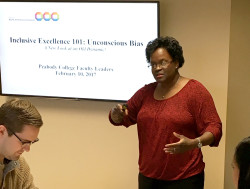
Supporting a campuswide initiative to combat unconscious bias, Vanderbilt’s Office for Equity, Diversity and Inclusion has launched a new webpage and series of workshops focused on how to recognize and learn to stop making these automatic and unfair judgments.
An excellent collaborative effort is underway led by Provost and Vice Chancellor Susan R. Wente, Vice Chancellor for Equity, Diversity and Inclusion George Hill, and Vice Chancellor for Administration Eric Kopstain to develop unconscious bias educational opportunities for faculty, staff and students.
The new EDI webpage features definitions and examples of unconscious bias and a listing of events and workshops – both past and upcoming – to help the university community develop strategies to work past these often quick judgments and prejudices and appreciate people for who they are. It also includes links to additional reading, courses and resources.
“Because unconscious bias is typically an automatic response, many people don’t have the checks and balances typically used in decision making,” Barnes said. “This kind of thought process tends to occur quickly without people often noticing. It usually manifests itself through long-held perceptions and stereotypes.” Barnes has led on organizing the new webpage and the EDI office resources, as well as coordinating several committees working on the planning for unconscious bias training and now, providng with others, leadership in training.
“Another dynamic is the tendency for unconscious bias to be exhibited toward vulnerable groups,” she added. “We all have biases, but unconscious bias tends to be meted out on racial and ethnic minorities, or based on factors such as class, gender, sexual orientation, religious beliefs, able-bodiness and other diverse traits.”
Vice Chancellor George Hill noted, “It is clear from conversations with students, faculty and staff that attention to unconscious bias is a very high priority. We must come together collaboratively to meet the challenges we face and continue to make progress. Programs, videos and workshops are being developed to specifically provide guidance and training.”
The provost’s office, the division of administration and the EDI office worked together to assess what unconscious bias programming was already in place on campus, identify gaps and create programming.
For example, within Academic Affairs, Wente and Dean of Students Mark Bandas launched fall and spring sessions for faculty, staff and students on cultural competence and difficult conversations. The sessions are hosted and organized by the Dean of Students’ Office of Inclusion Initiatives and Cultural Competence. Last fall the provost’s office also held workshops for faculty led by Efrén Pérez, an associate professor of political science and one of the country’s leading experts on implicit bias.
EDI has had listening sessions with students, faculty and staff over the past year, and the Diversity, Inclusion and Community report noted the need for unconscious bias training. EDI’s series of eight workshops, titled “Inclusive Excellence,” covers unconscious bias, communication and collaboration, relationship building, ethnic dynamics, and sexuality and gender dynamics. Campus groups can request the presentations using this form.
“We want to educate people about unconscious bias and further Vanderbilt’s goal of inclusive excellence and teach them how to counter these biases in helpful and holistic ways,” Barnes said. “You do better when you know better.”
Nine tips to combat unconscious bias
- Tell your story and listen to the stories of others.
- Avoid stereotypes and overgeneralizations.
- Separate feelings from facts.
- Have a diverse group of people around the decision-making table.
- Engage in self-reflection to uncover personal biases.
- Develop safe and brave spaces to discuss unconscious bias.
- Be an active ally.
- Don’t expect a quick fix.
- Develop processes and structures for increased accountability.